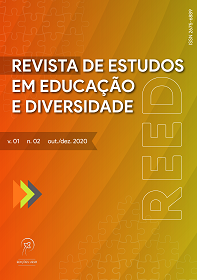PUBLIC POLICIES FOR CHILDHOOD EDUCATION: A DEBATE ON THE EXPANSION OF THE OFFER AND THE TRAINING OF TEACHERS
DOI:
https://doi.org/10.22481/reed.v1i2.7900Keywords:
Early Childhood Education, Teacher training, Educational Public PoliciesAbstract
The article deals with relations between public policies for expanding the supply of Early Childhood Education and favorable conditions for the teaching and learning process, including teacher training. It discusses challenges of this stage associated with the physical infrastructure of schools, didactic-pedagogical issues and financing, expanding the debate on the role and training of teachers in the political, economic and social scenario. It presents the process of repealing the National Curriculum Guidelines for Teacher Training (DCNFP) and the implementation of the National Curriculum Guidelines for Initial Teacher Training for Basic Education that establishes the Common National Base for the Initial Training of Teachers of Basic Education- BNC Training. It shows that there is a distance between the access policy and the guarantee of conditions for the teaching and learning process in early childhood education institutions and proposes the implementation of the collaboration system between the Union, States and Municipalities and the revision of new sources of financing for the education, in addition to the Fund for Maintenance and Development of Basic Education and Valorization of Education Professionals (FUNDEB). It aims to signal the mobilization of entities, unions and educators against the dismantling of public education and to guarantee educational and professional rights conquered.
Downloads
References
BRASIL. Lei de Diretrizes e Bases da Educação Nacional - Lei nº 9394/96. Brasília: MEC, 1996.
_____. Plano Nacional de Educação (2014-2024). Brasília: MEC, 2014.
_____ . Constituição da República Federativa do Brasil. Brasília, 1988.
_____. Ministério da Educação e do Desporto. Critérios para um atendimento em creches que respeite os direitos fundamentais das crianças. Brasília: MEC/SEF/DPE/Coedi, 1997.
_____. Parâmetros de qualidade para a Educação infantil. Brasília: MEC, 2008.
_____. Lei n.11.494, de 24 de junho de 2007. Fundo de manutenção e desenvolvimento da Educação Básica (FUNDEB). Brasília: MEC, 2007.
_____. Revisão das Diretrizes Curriculares Nacionais para a Educação Infantil. Parecer nº 20/2009, aprovado em 11/11/2009.
______. Diretrizes Curriculares Nacionais para a Formação Inicial e Continuada dos Profissionais do Magistério da Educação Básica. Parecer nº 2/2015, de 9 de junho de 2015. Brasília: Ministério da Educação, 2015.
_______. Resolução CNE/CP nº 02, de 20 de dezembro de 2019. Define as Diretrizes Curriculares Nacionais para a Formação Inicial de Professores para a Educação Básica e institui a Base Nacional Comum para a Formação Inicial de Professores da Educação Básica (BNC-Formação). Ministério da Educação. Conselho Nacional de Educação. Conselho Pleno. Brasília: MEC, 2019.
_____. Censo Escolar 2019 - Notas Estatísticas. Brasília, 2020.
CAMPOS, M. M. Entre as políticas de qualidade e a qualidade das práticas. Cadernos de Pesquisa, v.43, n.148, p.22-43, jan./abr. 2013. Disponível em: https://www.scielo.br/scielo.php?pid=S0100-15742013000100003&script=sci_abstract&tlng=pt Acesso em: 18 de set. 2020
DOURADO, Luiz Fernandes. Diretrizes Curriculares Nacionais para a formação inicial e continuada dos profissionais do magistério da Educação Básica: concepções e desafios. Educação & Sociedade, v. 36, n. 131, p. 299-324, 2015. Disponível em: https://doi.org/10.1590/ES0101-73302015151909. Acesso em: 01 de nov. 2020
_________. Formação de profissionais do magistério da Educação Básica: novas diretrizes e perspectivas. Comunicação & Educação, n. 1, p. 27-39, 2016. Disponível em: http://www.revistas.usp.br/comueduc/article/view/110712 Acesso em: 10 de out. 2020
GATTI, B. A. (org.) BARRETO, E. S. de Sá; ANDRÉ. M. E. D. A. Políticas docentes no Brasil: um estado da arte. Brasília: UNESCO, 2011.
KRAMER, S.; NUNES, M. F. Educação Infantil e expansão da escolaridade obrigatória: questões para a política, a formação e a pesquisa. In: CARVALHO, M. C. et al. (Orgs). Educação Infantil: formação e responsabilidade. 1ed- Campinas, SP: Papirus, 2013. p. 31-47.
PERONI, V. M. V. Política educacional e papel do Estado no Brasil dos anos 90. São Paulo: Xamã, 2003.
ROSEMBERG, F.; ARTES, A. O rural e o urbano na oferta de educação para crianças de até 6 anos. In: BARBOSA, Maria Carmem. et al. (coord.) Oferta e demanda de educação infantil no campo. Porto Alegre: Evangraf/MEC/UFRGS, 2012.
SAVIANI, D. Pedagogia: o espaço da educação na universidade. Cadernos de Pesquisa, v. 37, nº 130, p. 99-134, jan. 2007. Disponível em: https://www.scielo.br/scielo.php?pid=S0100-15742007000100006&script=sci_abstract&tlng=pt Acesso em: 01 nov. 2020
_________. PDE – Plano de Desenvolvimento da Educação: Análise crítica da política do MEC. Campinas/SP: Autores Associados, 2009
Downloads
Published
How to Cite
Issue
Section
License
You are free to:
Share - copy and redistribute the material in any medium or format; Adapt - remix, transform, and build from the material for any purpose, even commercially. This license is acceptable for Free Cultural Works. The licensor cannot revoke these freedoms as long as you follow the terms of the license.
Under the following terms:
Attribution - You must appropriately give credit, provide a link to the license, and indicate if any changes have been made. You may do so in any reasonable way, but not in a way that suggests that you or your use is endorsed by the licensor.
There are no additional restrictions - You cannot apply legal terms or technological measures that legally restrict others to make any use permitted by the license.






